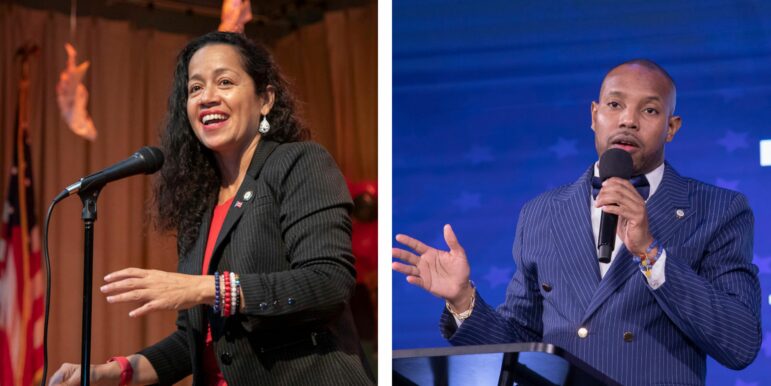During her tenure, Avilés, who became chair of the City Council’s Committee on Public Housing in January 2022, began questioning NYCHA’s high vacancy and low turnover rates. Banks says he wants to scrutinize the authority’s new funding models.

John McCarten/NYC Council Media Unit
City Councilmembers Alexa Avilés and Chris Banks, outgoing and incoming chairs of the Committee on Public Housing.She pressed New York City Housing Authority officials to explain how NYCHA racked up close to $80 billion in capital repair needs over the next 20 years. She rallied for NYCHA youth whose programming was abruptly discontinued, and advocated for public housing residents who were relegated to the back of the line for pandemic rental assistance.
But looking back over her two years as chair of the Committee on Public Housing, City Councilmember Alexa Avilés says there’s more she would have liked to explore. For example, she’d hoped to have a more “investigative eye” on the Permanent Affordability Commitment Together (PACT) program and the Public Housing Preservation Trust, two funding models that pull NYCHA complexes out of traditional public housing status.
“I feel like we kind of scratched the surface in many ways,” Avilés told City Limits recently, shortly after a committee shakeup rolled out by Speaker Adrienne Adams in mid-January. “The protection and strengthening of public housing as a housing source is very much at risk right now.”
The South Brooklyn councilmember, now chair of the Committee on Immigration, has passed the torch to freshman Councilmember Chris Banks, who represents neighborhoods including East New York and Brownsville, having unseated body veteran Charles Barron in November.
Though the switch came as a surprise, Avilés said, she is ready for the new post as “both issues are critical to my district and to New York City as a whole.” She will also maintain a seat on the public housing committee.
Chairing the committee didn’t come with wide-ranging legislative authority according to Avilés, who took the post in early 2022.
“NYCHA… receives a majority of its money from the federal government and we are sitting as a city councilmember with very limited oversight, limited ability to legislate this agency,” she said.
But the committee still has an important responsibility to lift up resident voices, she added: “The hearings become such important mechanisms for residents to surface… their on-the-ground experience.”
One emergent issue during Avilés’ tenure was apartment vacancies. She examined why the number of vacant apartments jumped from 500 in November 2021 to more than 3,000 a year later in December 2022. The number subsequently hit 4,800 in September 2023.
Avilés also highlighted that, along with the more than 200,000 New Yorkers on the waitlist for a NYCHA apartment, existing tenants waiting for an emergency transfer are also affected by the slow-moving turnaround process—approximately 409 days on average between July and October 2023, up 37 percent from the prior year.
NYCHA has attributed the delays to necessary environmental upgrades in vacant apartments, as well as a staffing shortage in the wake of the COVID-19 pandemic.
“Certainly the vacancy issue is one that has an impact citywide,” Avilés told City Limits. “Even with its persistent conditions and challenges, it is still the housing stock that is most needed in New York City.”
Banks described Avilés as a “strong voice” for NYCHA residents.
Prior to being voted chair, Banks, a former Brooklyn Community Board 5 member, said he advocated for NYCHA residents through tenant and community organizing in his district —fighting for repair issues and “just basic rights.”
Under his leadership, Banks said, NYCHA residents are going to have “someone who prioritizes NYCHA and will fight to make sure they get the dignity and respect that they deserve.”
In his new role, Banks said he will focus on developments like Nostrand Houses in Brooklyn, the first in the city to join the Preservation Trust, and the Fulton and Elliott-Chelsea Houses, the first PACT development that could see demolition.
Banks added that his own district has already seen several developments converted to PACT, in which NYCHA puts private developers in charge of repairs and day-to-day operations.
“We had a development, Fiorentino Houses, where they relocated everybody out of the buildings, as opposed to Boulevard or Linden Houses that were in-place renovations,” he said.
According to Banks, some of the residents who went through the conversion process have mixed feelings about the repairs that have been made.
“There are some serious concerns about RAD-PACT and these conversions because at the end of the day we want to make sure that this is an investment and that this is not a get-rich scheme,” Banks said.
While the Committee on Public Housing has yet to schedule any hearings this year, Banks said his message for NYCHA is to be prepared.
“Get ready for the ride,” Banks said. “We’re going to hold them accountable and we’re going to demand transparency.”
To reach the reporter behind this story, contact Tatyana@citylimits.org. To reach the editor, contact Emma@citylimits.org.








